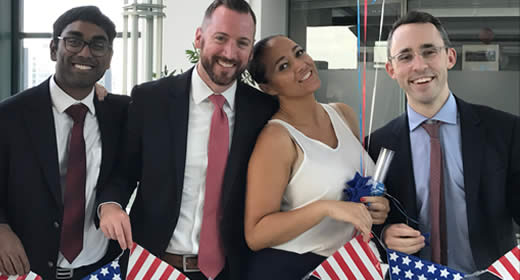
Anthony Cozart (MPP '18) submitted this field report from his summer 2017 internship at The European Bank for Reconstruction and Development (EBRD) in London.
I’ve just finished working this summer for The European Bank for Reconstruction and Development (EBRD) in London. Founded after the fall of the Soviet Union, the Bank invests in businesses in developing economies in, and around, Europe. In addition, it helps governments implement reforms to stimulate business activity, investment, and development.
- Review more internship field reports from Ford School students serving organizations around the world.
That the Bank works to improve policy, in engagements that often make little or no money, is one of several traits that make the EBRD different from a commercial bank. Another characteristic is that its shareholders are countries, each represented by a board director. I worked this summer in the U.S. shareholder office, for the Alternate Director Brian McCauley (MPP ’07).
I split my time between reviewing investment proposals before the Board, and helping our office provide comments to Management on a range of governance matters. Every two weeks, the Board would meet to approve or reject projects. During each of these cycles, I reviewed the fine print of project documents to ensure that each project was ambitious, and aligned with the U.S. government’s policy positions, objectives, and laws. We’d come together as a team before each Board meeting to discuss both the strong and weak aspects of projects, and to draft questions for colleagues in Washington and at the Bank.
In addition to reviewing projects, I summarized and provided comments on management proposals and presentations. These proposals included how to measure the Bank’s development impact, plans to expand a key policy initiative, staffing decisions, evaluation reports, and strategic reviews.
Before starting at the Ford School last fall, I knew little about working at a development bank; I’d come to Ann Arbor having spent almost two years as an economics research assistant, with the hope of using economics to improve policy and outcomes. I enjoyed working at the EBRD, in part, because I engaged with economic ideas when seeking to understand development projects, or answer governance-related questions. While I wasn’t working with data, and mostly reviewed the work of bankers and management, I learned every day from my international colleagues. And seeing the impact of the Bank’s work was satisfying: In my first week, the board approved financing for what will be the world’s largest solar energy complex, in Egypt, that will help their economy become less energy intensive and more stable.
Anthony Cozart (MPP '18) is interested in applying ideas from economics, with the analysis of data, to improve policy and the decisions of individuals and companies. He studied economics and the liberal arts at the University of Wisconsin-Madison. After graduating, he worked as an empirical research assistant for Yale Professor Ian Ayres on a range of law and economics projects and papers.
Anthony Cozart's internship was made possible with a grant from the Ford School's International Policy Center, which supports interdisciplinary research, education, and policy dialogue on international economics, security, and human rights. The goal: To demonstrate how, in an interdependent world, well-designed policies of governments and international institutions can improve human welfare, especially in developing nations.
